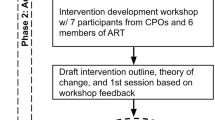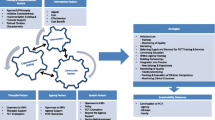Abstract
The purpose of this paper is to present a case study of “evidence-based” program uptake and implementation. The process of integrating Triple P (levels 2 and 3) into existing family support centers in Alberta, Canada, was examined. We conducted ten individual interviews with directors, and ten group interviews, involving a total of 62 practitioners across ten Triple P pilot sites. Key findings show that there was variability in the approach and extent to which Triple P was integrated into family support centers. Five key factors impacting the integration process emerged from the interviews. These were: (1) the level of development of pre-existing support services; (2) the degree of “fit” between the Triple P program approach and existing agency practice, including the perceived suitability/unsuitability for some client groups; (3) practitioner perceptions of the adaptability of the program; (4) rules about who can and who cannot use Triple P resources; and (5) training and sustainability issues. In addition to identifying specific factors, this study was able to provide some insight as to why and how these factors were significant, thereby adding to the literature on knowledge/program dissemination processes.
Similar content being viewed by others
References
Aarons, G. A., & Palinkas, L. A. (2007). Implementation of evidence-based practice in child welfare: Service provider perspectives. Administration and Policy in Mental Health and Mental Health Services Research, 34, 411–419.
Addis, M. E. (2002). Methods for disseminating research products and increasing evidence-based practice: Promises, obstacles, and future directions. Clinical Psychology: Science and Practice, 9, 367–378.
Addis, M. E., & Krasnow, A. D. (2000). A national survey of practicing psychologists’ attitudes toward psychotherapy treatment manuals. Journal of Consulting and Clinical Psychology, 68, 331–339.
Bernard, H. R. (2000). Social research methods: Qualitative and quantitative approaches. Thousand Oaks, CA: Sage.
Berwick, D. M. (2003). Disseminating innovations in health care. Journal of the American Medical Association, 289, 1969–1975.
Berwick, D. M. (2008). The science of improvement. Journal of the American Medical Association, 299, 1182–1184.
Clegg, S. (2005). Evidence-based practice in educational research: A critical realist critique of systematic review. British Journal of Sociology of Education, 26, 415–428.
Corelli, R., Fenlon, C., Kroon, L., Prokhorov, A., & Hudmon, K. (2007). Evaluation of a train-the-trainer program for tobacco cessation. American Journal of Pharmaceutical Education, 71, 1–9.
Dean, C., Myors, K., & Evans, E. (2003). Community-wide implementation of a parenting program: The south east Sydney positive parenting project. Australian e-Journal for the Advancement of Mental Health, 2. Retrieved December 1, 2010 from http://www.reachoflouisville.com/meath/meath/Community-wide%20Implementation%20of%20a%20Parenting%20Program%20The%20South%20East%20Sydney%20Positive%20Parenting%20Project.pdf
Kvale, S. (1996). Interviews: An introduction to qualitative research interviewing. Thousand Oaks, CA: Sage.
Kumpfer, K. L., Alvarado, R., Smith, P., & Bellany, N. (2002). Cultural sensitivity and adaptation in family-based prevention interventions. Prevention Science, 3, 241–246.
La Caze, A. (2009). Evidence-based medicine must be…. The Journal of Medicine and Philosophy, 34, 509–527.
Landry, R., Amara, N., Pablos-Mendes, A., Shademani, R., & Gold, I. (2006). The knowledge-value chain: A conceptual framework for knowledge translation in health. Bulletin of the World Health Organization, 84, 597–601.
Linney, J. A. (1990). Community psychology into the 1990s: Capitalizing opportunity and promoting innovation. American Journal of Community Psychology, 18, 1–17.
Mayan, M. (2009). Essentials of qualitative inquiry. Walnut Creek, CA: Left Coast Press.
McLellan, J., Leon, T., Haffey, S., & Barker, L. (2009). Exporting a Canadian parenting education program to the Dominican Republic. Public Health Nursing, 26, 183–191.
Miles, M., & Huberman, A. (1994). Qualitative data analysis: A sourcebook of new methods (2nd ed.). Thousand Oaks, CA: Sage.
Ogden, T., Forgatch, M. S., Askeland, E., Patterson, G. R., & Bullock, B. M. (2005). Implementation of parent management training at the national level: The case of Norway. Journal of Social Work Practice, 19, 317–329.
Rapp, C. A., Etzel-Wise, D., Marty, D., Coffman, M., Carlson, L., Asher, D., et al. (2010). Barriers to evidence-based practice implementation: Results of a qualitative study. Community Mental Health Journal, 46, 112–118.
Richards, L., & Morse, J. M. (2007). Read me first for a user’s guide to qualitative methods (2nd ed.). Thousand Oaks, CA: Sage.
Rogers, E. M. (1995). Diffusion of innovations (4th ed.). New York: Free Press.
Sanders, M. R., & Turner, K. M. (2005). Reflections on the challenges of effective dissemination of behavioral family intervention: Our experience with the Triple P—Positive Parenting Program. Child and Adolescent Mental Health, 10, 158–169.
Sanders, M. R., Turner, K. M., & Markie-Dadds, C. (2002). The development and dissemination of the Tripe P- Positive Parenting Program: A multi-level, evidence-based system of parenting and family support. Prevention Science, 3, 173–189.
Sanders, M. R., Prinz, R. J., & Shapiro, C. J. (2009). Predicting utilization of evidence-based parenting interventions with organizational, service-provider and client variables. Administration and Policy in Mental Health and Mental Health Services Research, 36, 133–143.
Schinke, S. P., Botvin, G. J., & Orlandi, M. A. (1991). Substance abuse in children and adolescents: Evaluation and intervention (Vol. 22). Thousand Oaks, CA: Sage.
Seng, A., Prinz, R., & Sanders, M. (2006). The role of training variables in effective dissemination of evidence-based parenting interventions. International Journal of Mental Health Promotion, 8, 19–27.
Simons, L., Lathlean, J., & Squire, C. (2008). Shifting the focus: Sequential methods of analysis with qualitative data. Qualitative Health Research, 18, 120–132.
Spring, B. (2007). Evidence-based practice in clinical psychology: What it is, why it matters; what you need to know. Journal of Clinical Psychology, 64, 611–631.
Strauss, A., & Corbin, J. (1998). Basics of qualitative research: Techniques and procedures for developing grounded theory (2nd ed.). Thousand Oaks, CA: Sage.
Triple P. (2010). What is Triple P? Retrieved December 4, 2010 from http://www27.triplep.net/?pid=29.
Acknowledgement
The work was supported by a grant from the Alberta Centre for Child, Family and Community Research.
We would like to thank Laura Hedlin for her research assistance on this manuscript. We would also like to thank two anonymous reviewers who provided valuable feedback on this paper.
Author information
Authors and Affiliations
Corresponding author
Rights and permissions
About this article
Cite this article
Breitkreuz, R., McConnell, D., Savage, A. et al. Integrating Triple P into Existing Family Support Services: A Case Study on Program Implementation. Prev Sci 12, 411–422 (2011). https://doi.org/10.1007/s11121-011-0233-6
Published:
Issue Date:
DOI: https://doi.org/10.1007/s11121-011-0233-6




